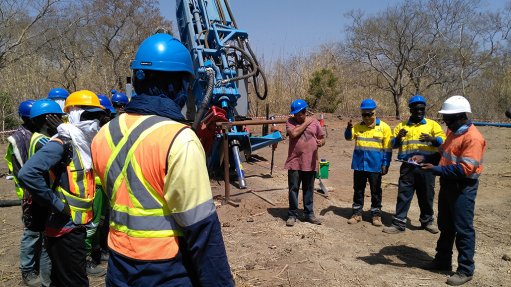Mining modernisation to be highlighted



CHRISNA EVANS Evans will participate in a panel discussion delving into the theme ‘Shared data and interoperability in mining: Are African miners doing enough?’
IAN MACKAY Mackay will host a panel on the critical topic ‘Automation in Africa’
At this year’s Investing in African Mining Indaba, professional services firm PwC will focus on the implications of embracing new technologies, strategies and ideas that can bring about significant positive changes in the African mining industry.
The PwC Smart Mining team will participate in a panel discussion – titled ‘Shared data and interoperability in mining: Are African miners doing enough?’ – on Monday, February 5.
PwC will also host a panel focusing on the topic ‘Automation in Africa’, on Tuesday, February 6.
Throughout the Indaba – to be held at the Cape Town International Convention Centre, from February 5 to 8 – the PwC Smart Mining team will actively engage in dialogues that explore technological advancements being made in the African mining industry.
PwC assistant director Chrisna Evans and PwC Smart Mining senior manager Ian Mackay describe the mining industry as an “ever-evolving industry”, noting that adaptation and innovation are key to sustainability and growth.
Adaptation and innovation include the willingness from the industry to explore new data-driven approaches and information paradigms that might result in substantial positive changes in how data is harnessed, interpreted and used, they say.
“We are looking forward to seeing how miners are tackling the challenges that a de-globalising world presents. We anticipate significant advancements, especially in supply chain optimisation empowered by technology.”
The firm will also focus on the relevance of asset management in mining, with the duo pointing out that asset management technologies have demonstrated substantial and measurable benefits for miners.
Positive Disruptions
Positive disruptions in mining include the introduction of technologies that allow for economical mining in previously uneconomical orebodies through improved planning and management of the block mining model.
Further, the imperative to break down the existing ‘silos’ within mining operations and leveraging data for end-to-end optimised processes remains a critical objective for industry enhancement, adds Evans.
Evans and Mackay also point out that applying advanced process control, either through data or condition monitoring, which helps mines to increase throughput and the recovery of metals, is also disrupting the industry.
The rate of adoption of digital technologies also has positive implications for safety, as mines are digitising the speed at which information is shared. Evans says this can help mines identify unsafe working areas before the next shift takes place.
Additionally, leveraging Big Data analytics allows for not only predictive modelling of safety incidents but also proactive interventions based on historical patterns and real-time data, thereby reducing potential safety risks.
However, Mackay highlights that challenges with the adoption of technology also persist in the form of, for example, cybersecurity risks.
“Embracing Fourth Industrial Revolution (4IR) technologies requires a cultural shift towards technology adoption. Providing awareness and education about these technologies can ensure the effective adoption of technology while fostering a culture of safety.”
However, miners cannot change the value of their product on the open market. Without a competitive advantage, such as in so-called green metals that are produced using solar or hydroelectric power, they cannot achieve a premium on the market for their products; therefore, miners need to control costs and mine economically accessible ore bodies to remain sustainable, note Evans and Mackay.
Making Business Easier
Automation can also help miners to achieve consistent results across processes, maintain their adherence to the business plan and significantly reduce the long-term operational cost.
“Faster, more effective decision-making, maintaining your fleet in such a way that it doubles the hours specified by original- equipment manufacturers, and monitoring your processes – thereby improving recoveries in concentrate – using advanced process controls, are key to maintaining a competitive advantage in future,” the duo explain.
They posit that upskilling the workforce is, thus, necessary to ensure the preservation of jobs and that miners use data effectively in decision-making processes.
In this regard, PwC is collaborating with universities, the Council for Scientific and Industrial Research, and Minerals Council South Africa to help shape the future of mining.
Comments
Press Office
Announcements
What's On
Subscribe to improve your user experience...
Option 1 (equivalent of R125 a month):
Receive a weekly copy of Creamer Media's Engineering News & Mining Weekly magazine
(print copy for those in South Africa and e-magazine for those outside of South Africa)
Receive daily email newsletters
Access to full search results
Access archive of magazine back copies
Access to Projects in Progress
Access to ONE Research Report of your choice in PDF format
Option 2 (equivalent of R375 a month):
All benefits from Option 1
PLUS
Access to Creamer Media's Research Channel Africa for ALL Research Reports, in PDF format, on various industrial and mining sectors
including Electricity; Water; Energy Transition; Hydrogen; Roads, Rail and Ports; Coal; Gold; Platinum; Battery Metals; etc.
Already a subscriber?
Forgotten your password?
Receive weekly copy of Creamer Media's Engineering News & Mining Weekly magazine (print copy for those in South Africa and e-magazine for those outside of South Africa)
➕
Recieve daily email newsletters
➕
Access to full search results
➕
Access archive of magazine back copies
➕
Access to Projects in Progress
➕
Access to ONE Research Report of your choice in PDF format
RESEARCH CHANNEL AFRICA
R4500 (equivalent of R375 a month)
SUBSCRIBEAll benefits from Option 1
➕
Access to Creamer Media's Research Channel Africa for ALL Research Reports on various industrial and mining sectors, in PDF format, including on:
Electricity
➕
Water
➕
Energy Transition
➕
Hydrogen
➕
Roads, Rail and Ports
➕
Coal
➕
Gold
➕
Platinum
➕
Battery Metals
➕
etc.
Receive all benefits from Option 1 or Option 2 delivered to numerous people at your company
➕
Multiple User names and Passwords for simultaneous log-ins
➕
Intranet integration access to all in your organisation



















